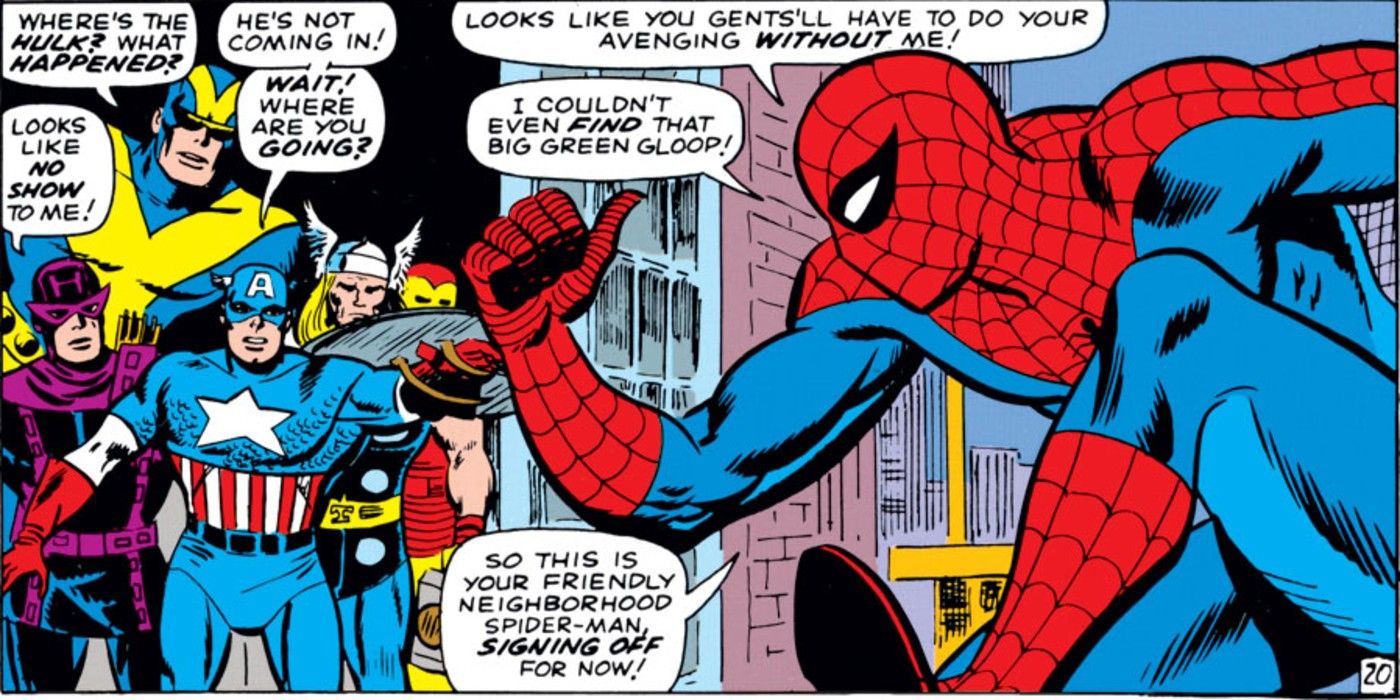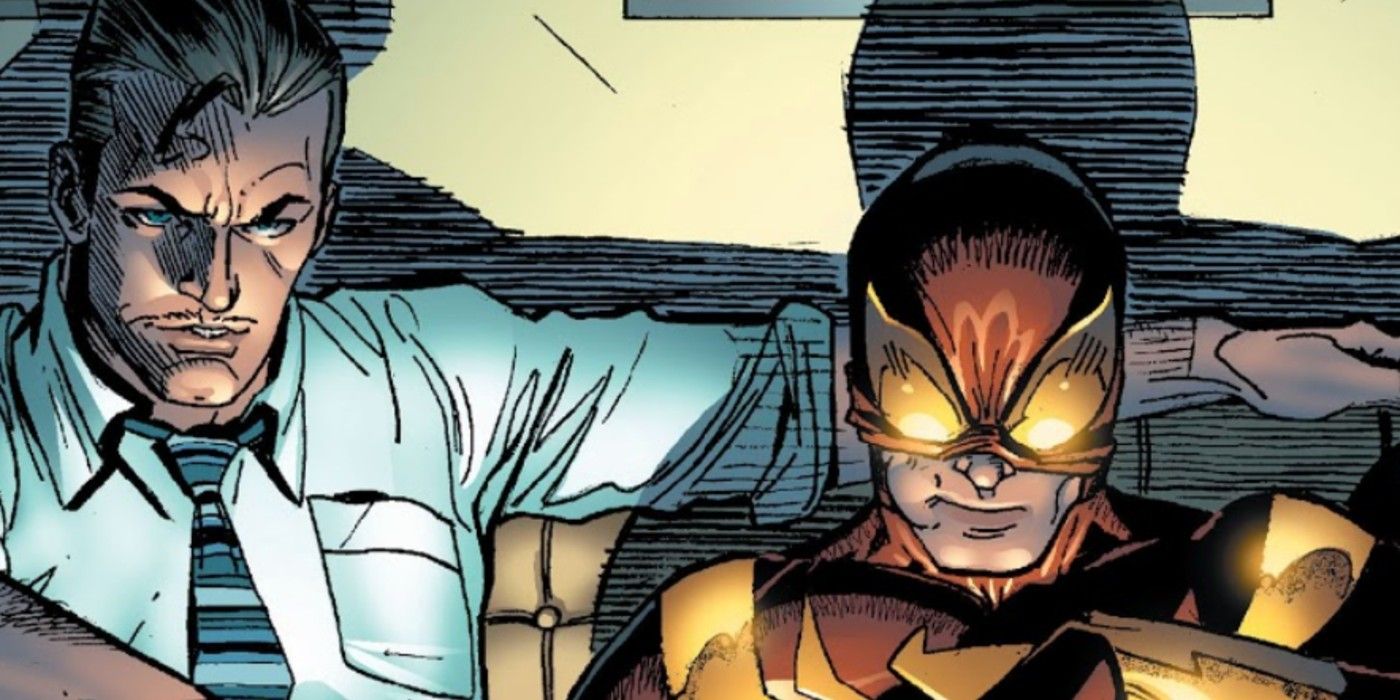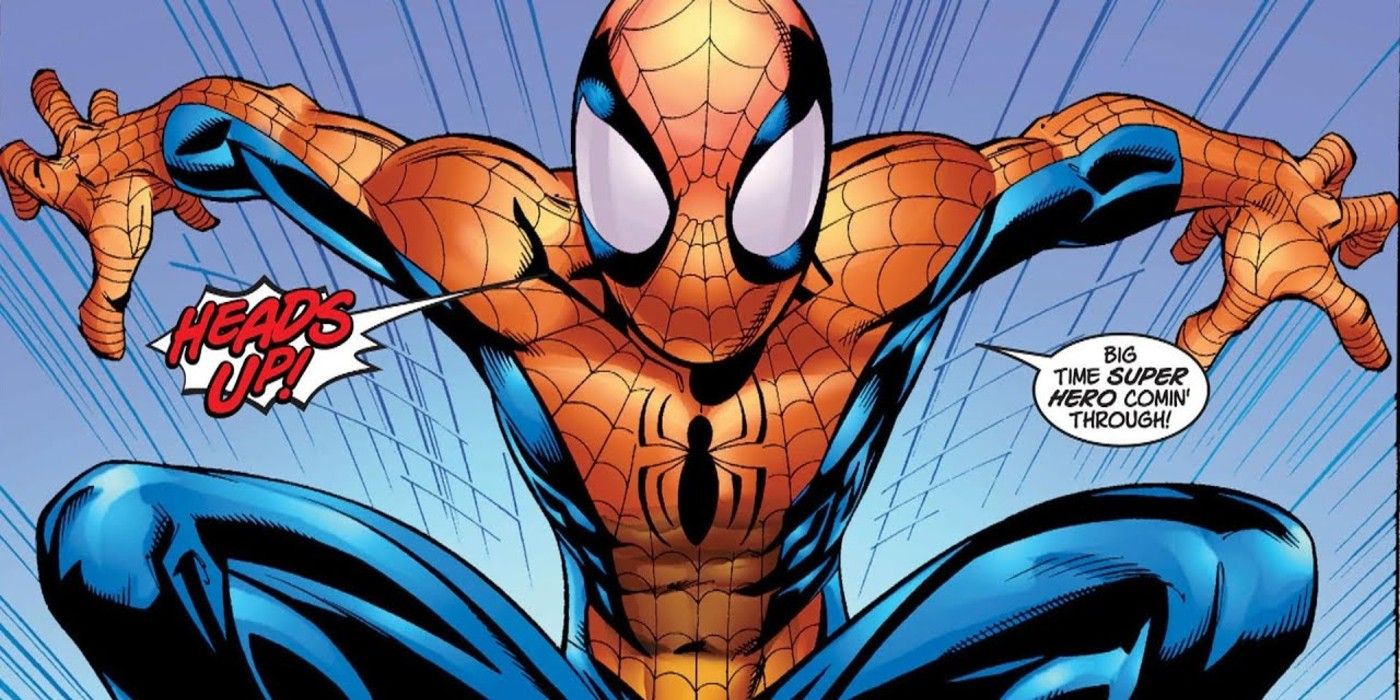When it comes to Spider-Man's numerous film adaptations, there's a pretty general consensus among fans that Sam Raimi's Spider-Man trilogy was the most faithful representation of the comic book character, while the Marvel Cinematic Universe carved its own path, with very little inspiration from the comics. Moreover, one of the most echoed criticisms of Spidey's MCU arc thus far is his overreliance on Robert Downey's Jr.'s Iron Man, with many believing that Tom Holland's version of the character has been reduced to little more than a glorified Tony Stark protégé. Despite these critiques, the MCU Spider-Man continues to have no shortage of fan support. But it may come as a surprise to even the most knowledgeable MCU Spidey patrons that Peter Parker's big-screen dynamic with Tony is more based on comics than a lot of audiences realize.
Popular comic book characters from the likes of both Marvel and DC exist in a multitude of formats, extending into different mediums with surrounding attributes that evolve with the times. Characters like Spider-Man are timeless; their core defining attributes can apply to any time period or setting and still ring true. So, when Spider-Man's film rights were granted to Marvel Studios by phase three of their ever-evolving interconnected universe, the studio elected to adapt the lesser-known stories from Spidey's web of history that pitted the friendly neighborhood hero's values against the grandeur of Avenger-adjacent heroes like Iron Man.
Spider-Man: Homecoming Is An Adaptation Of The Amazing Spider-Man Annual #3
While Spider-Man wouldn't become an official member of The Avengers until 2004's The New Avengers, 1966 featured Peter's first-ever attempt at joining Earth's Mightiest Heroes. Though adapted to fit the mold of the established MCU, Spider-Man: Homecoming applied the same basic story structure found within the pages of The Amazing Spider-Man Annual #3. Just as Tony Stark recruited Peter as a part of his Avenging squad in Captain America: Civil War, Spider-Man receives a personal invite from Thor to become an Avenger. And similarly to Peter understanding that he must prove himself before Stark can accept him as an official member of the heroic team throughout Homecoming, the Avengers literally lay out a test for Spidey to pass before he can be formally initiated in the comic.
The Avengers task the web-head with finding a way to subdue the Hulk and bring him back to their headquarters. Only after succeeding in this will they accept the young hero into their squad. It's not long before Spider-Man finds the Hulk and begins battling the monstrous behemoth. But not long into their fight, the Hulk reverts back to Bruce Banner, causing Peter to find a moral dilemma with handing over a man who has no control over the rage monster inside him. "He needs help--not hatred! Understanding--not punishment!" Spidey decides to let Hulk go and returns to Avengers' HQ to tell the heroes he couldn't track down the Hulk and therefore will not be joining their team.
In Homecoming, Stark represents the test Peter must pass in order to earn his notoriety as an Avenger. The eager youngster believes if he takes down and turns in the villainous Vulture, Stark will see him as fit to join. And he's not wrong, as Stark offers Peter an official team position following his thwarting of the antagonist at the end. Only just before defeating Vulture, Peter learns that Adrian Toomes is but a monster of Tony's own making; a corrupted soul who feels slighted by Iron Man's direct actions. Peter's turning down his spot on the Avengers in Homecoming echoes his sentiment in Annual #3 because in both instances Peter sees the ethical greyness in being an Avenger. Homecoming frames this moment by Peter telling Stark he wants to stick with being a friendly neighborhood Spider-Man because as a fifteen-year-old kid, he's not yet ready to deal with the moral difficulties that the elite billionaire Stark and his strike team must operate around. Calling his own shots and helping everyday people in the streets of his neighborhood is a far more manageable responsibility to bear - a thematic conclusion Peter comes to in the comic just as well.
Tony Stark and Peter Parker's Mentor/Mentee Relationship Was Birthed In Comics
Most MCU fans are aware that Tony created the Iron-Spider suit for Peter in comics, but there's also a belief that the similarities between the two characters' comic and film relationship ends there - and for good reason, too. It's well known that 2006's Civil War comic features a very different dynamic between Stark and Peter. For starters, Peter is much older and experienced. And although Spider-Man starts out on Iron Man's side of the superhero conflict, he switches to Captain America's team a short time after being convinced by Tony to reveal his secret identity to the world. The comic book relationship takes a much darker turn compared to the more warmhearted rapport the two share in the MCU. However, the three-issue prelude to Civil War contained within The Amazing Spider-Man and titled "Mr. Parker Goes to Washington," reveals a lesser-known, but very clearly inspired storyline for the mentor/mentee relationship utilized in Homecoming.
The events of this narrative see Tony personally asking Peter to be his protégé, with Peter accepting the role and even referring to the Armored Avenger as "boss" and "Mr. Stark." So much of Homecoming is an exploration of a middle-class, neighborhood-defending hero getting whisked away from his comfort zone and taken under the wing of an uber-wealthy adventurer - and this story is where that concept originated. Tony has Peter accompany him to Washington where they attend a closed hearing regarding the proposed Superhero Registration Act. Not unlike Homecoming, where Peter is faced with moral complications that extend beyond his simplistic neighborhood patrolling, the web-slinger is introduced to hyper-politicized critiques of superheroing spearheaded by Washington's elites; a far cry from webbing up everyday thieves. Peter is clearly a fish out of water in Iron Man's world just as he is in the movies. And as an added treat, this comic arc even features various scenes where Peter learns how to utilize his brand new Stark suit, including discovering his web-wings and launching himself off the Washington Monument, all moments adapted straight to the big-screen.
Ultimate Spider-Man is the backbone of the MCU Spider-Man
One of the most significant attributes regarding Peter and Tony's MCU relationship is the concept that Peter's a youthful teenager and Tony's a seasoned adult. With the pair's Civil War comic dynamic depicting both characters as experienced men with plenty of superhero experience under their belts, many viewers have assumed that the emphasis on Peter's exaggerated adolescence is unique to the MCU. But both Spidey's teenage perspective and some facets of his relationship with Iron Man originated in Marvel's Ultimate Universe. Launched in 2000, the Ultimate Universe was created to showcase fresh, modern retellings of Marvel's classic heroes. And it became a template, not just for Spider-Man's MCU depiction, but for a significant amount of what defines the MCU to this day. From S.H.I.E.L.D.'s hand in forming the Avengers to Samuel L. Jackson portraying Nick Fury and even Tony Stark's defining witty attitude, the Ultimate Universe inspired it all.
Ultimate Spider-Man depicts a fledgling hero in the very first year of his costumed career. And it's hard not to hear Tom Holland's voice in Ultimate Peter Parker's every word. So much of the book's comedy stems from an emphasis on his naïve perspective - an angle the wall crawler's MCU movies define themselves by. And while this version of Spider-Man never had as significant relation to Iron Man as the MCU version did, the concept of a super-authority overseeing a young Spidey's every move is one of its defining attributes. From Stark taking Peter's suit away and lecturing him about not being ready to Nick Fury (a.k.a. Talos) burdening the youngster with expectation, the MCU Spidey feels consistently held down by authority. And this theme is the bread and butter of Ultimate Spider-Man, where Fury fills the void occupied by Stark in Homecoming, allowing the web-head to only operate under his say-so. Fury's relationship with Peter isn't far off from Stark's either: imposing and sometimes harsh, while still conveying a shred of heart for the virtuous kid. And possibly the most prominent theme found in Ultimate Spider-Man is Peter's repeated disappointment with adults and their irresponsibility. This version of Spider-Man's story is a coming of age tale, where Peter comes to understand that there's an almost inescapable corruption to those who inherit great power - an insight Peter gains in the MCU when Toomes lectures him about the crooked jurisdiction held by uber-wealthy elites such as Tony Stark.
While the debate over which version of Spider-Man makes for a better movie may never be agreed upon, one thing's for certain, each one pulls their assortment of narrative ingredients from the character's vast library of comics. Raimi's trilogy earned its uber-comic-accurate reputation by drawing out the more essential components of Spider-Man's most iconic tales from the Silver and Bronze Age of comics. And while various aspects of just about every era can be found in Marvel Studios' rendition, they looked primarily toward the post-2000 Modern Age of comics for an inspiring and fresh take on both the web-slinger and his relationship with Tony Stark. In the end, the necessity of Spider-Man's guidance from Iron Man in the MCU comes down to subjective opinion, but its comic book accuracy holds up as fact.




